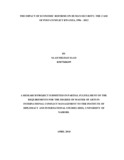| dc.description.abstract | This study examines the economic reforms in Rwanda post genocide more specifically during the period study where Rwanda has greatly seen a culture of transformation from war to peace and economic growth. The main objective of the study is to critically assess how Rwanda‘s economic reforms have contributed towards Human Security in all aspects from absence of violence to sustainable peace. The key question that the study seeks to answer is what economic reform measures have been put in place within Rwanda and the impact they have had on human security. The study also seeks to examine critically how effective leadership policies and participation have contributed to Human Security in Rwanda. The study utilized the Human Needs theory. The study was further informed by the Human Needs theorists approach that peace is only sustainable when at the very least various aspects of Human Needs and satisfaction are achieved. The study solely utilized secondary data. Secondary data included textbooks, newspapers, magazines, archival records, online publications and reports. The Rwandan genocide remains one of the worst civil wars in Africa that had devastating effects on the social, economic and political structures. The Rwanda conflict had deep rooted ethnic causes, moreso economic due to imbalance in distribution of wealth and land, lack of proper formal education and unemployment also contributed to the conflict in Rwanda. Poor governance, impunity and lack of proper functioning institutions of government also greatly contributed to the violence in Rwanda. Rwanda‘s genocide was a big wake up call for Africa that explained why indeed deep rooted causes of conflict cannot be ignored. The lessons learnt by Rwanda became the inspiration that indeed the country needed to pick up its pieces. Through the able leadership of Paul Kagame, Rwanda‘s revolution began with a blue print in place, the Rwanda‘s Vision 2020 launched in July 2000 became a reference guide to measures Rwanda took towards economic reforms which substantially contributed towards improved Human Security in the country. Human rights policies and the participation by Non - governmental Organization greatly assisted Rwanda improve its level of respect for human needs and the satisfaction thereof. Rwanda‘s approach to economic reforms was two fold. One that was participatory and one that was policy formulated. The participatory approach was though “Urugwire” which is a consultative process that originates from the grassroots village level and the policy framework methodology that borrows from experts. Rwanda had adopted the Singaporean policy system and it is what has been dubbed Vision 2020. The Vision 2020 aims at improving all sectors of the economy and Human Security by envisaging key areas of concretization which are poverty, education, sustainable development, market driven economies, employment creation and investment freedom. In terms of what the Vision 2020 has set to achieve, Rwanda has made great progress but with challenges which this study has addressed at length. However, no regime or program succeeds fully without key ingredients of equality, transparency and cooperation and to achieve such depends on leadership, maturity commitment and a well transformed and organized political setup which many counties in Africa find challenging to achieve | en_US |

